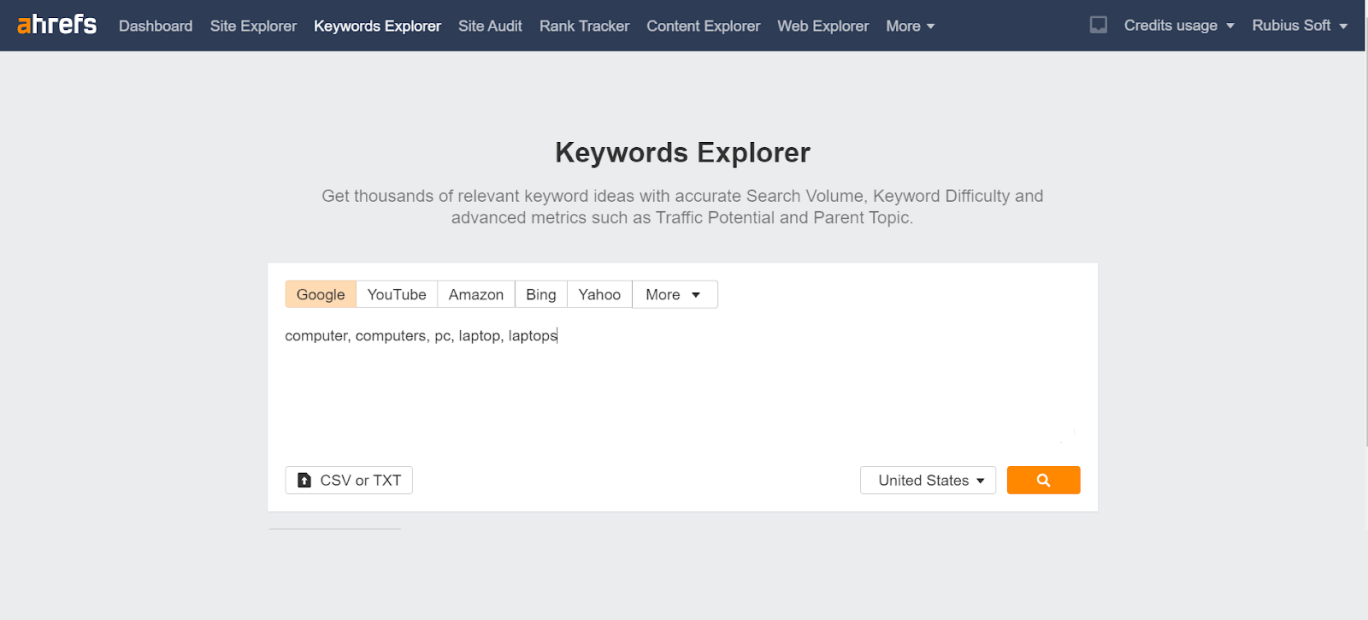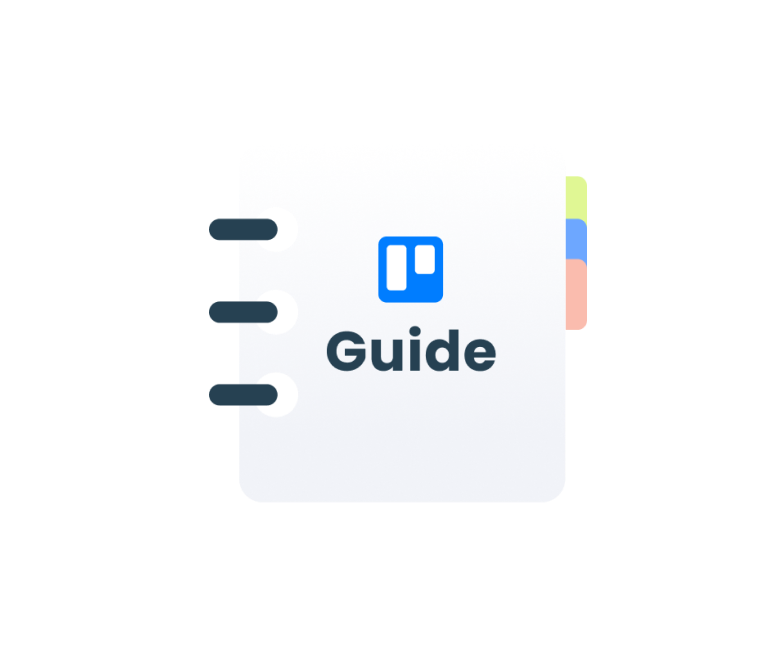How to Use Trello for Effective Project Management: The Complete Guide in 2026
How to Do Keyword Research to Increase Your Traffic and Revenue
In the competitive world of online business, harnessing the power of keyword research is essential for driving targeted traffic and boosting revenue. Keyword research helps you identify the most relevant and high-performing keywords that align with your business goals, enabling you to optimize your website's content and SEO strategies effectively. In this article, we will walk you through the process of conducting keyword research to increase your traffic and revenue.
1. Define Your Objectives
Before diving into keyword research, clearly outline your business objectives. Understand what products, services, or content you want to promote, and identify your target audience. By having a clear vision of your goals, you can tailor your keyword research to meet your specific needs.
2. Utilize Keyword Research Tools
Leverage various keyword search services to gather valuable keyword report. Tools like Google Keyword Planner, Ahrefs, SEMrush, etc. can provide data on search volumes, keyword difficulty, and related keyword suggestions.
Additionally, consider using a VPN as a tool to explore keywords from different locales by changing your IP address or search region.
3. Brainstorm Seed Keywords
Start your keyword research with seed keywords, which are the basic terms or phrases related to your business. Use your industry knowledge, customer feedback, and common search queries to generate a list of seed keywords. These initial terms will be the foundation for further exploration.
4. Analyze Long-Tail Keywords
After you get a list of seed keywords, make use of your keyword surfer and check Matching terms to unleash all the keywords that contain your targets. Long-tail keywords are longer, more specific phrases that tend to have lower search volumes but higher conversion potential. They often reflect users with clearer intent.
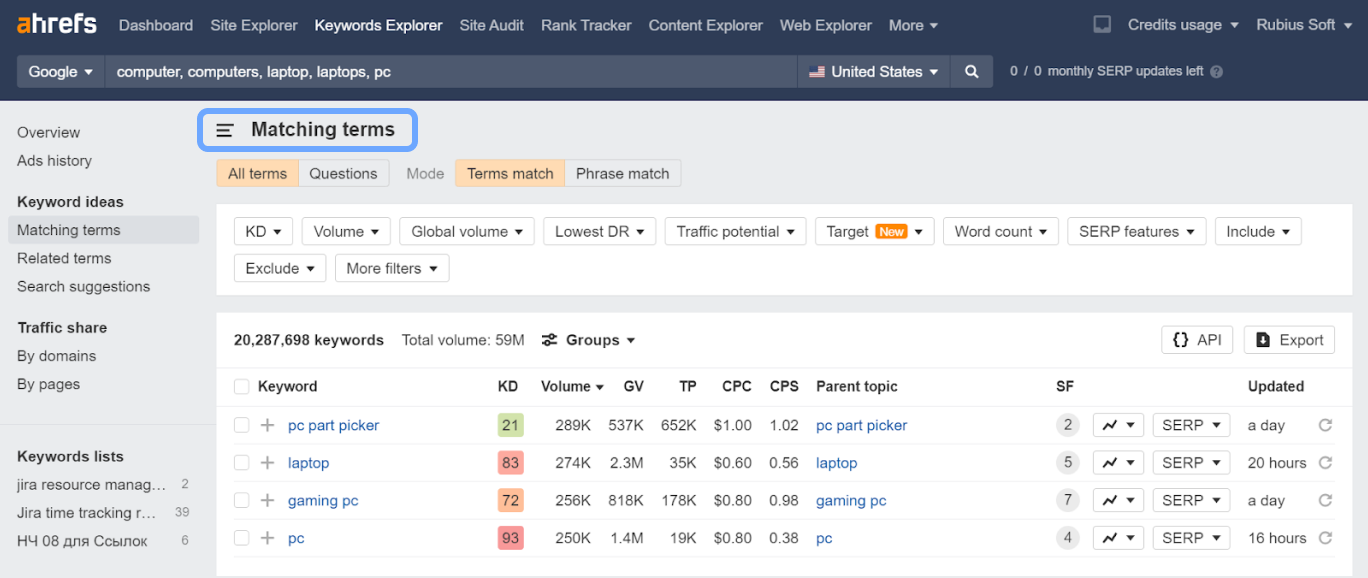
5. Understand User Intent
When selecting keywords, consider the user intent behind the search. In general, all keywords fall into four groups according to search intent that you can determine with keyword modifiers:
- Informational: to gain general knowledge of a topic. Keyword modifiers: how, what, who, where, guide, tutorial, tips, etc.)
- Navigational: has an end destination in mind. Keyword modifiers: brand names, name of a product or service.
- Commercial investigation: information on future purchase. Keyword modifiers: best, top, pricing, review, comparison, etc.
- Transactional: shows intent to buy. Keyword modifiers: buy, order, purchase, price, etc.
After you define the search intent for your page, add a list of relevant keyword modifiers to the filter and get the keyword report with all the juicy phrases that fall under your chosen category.
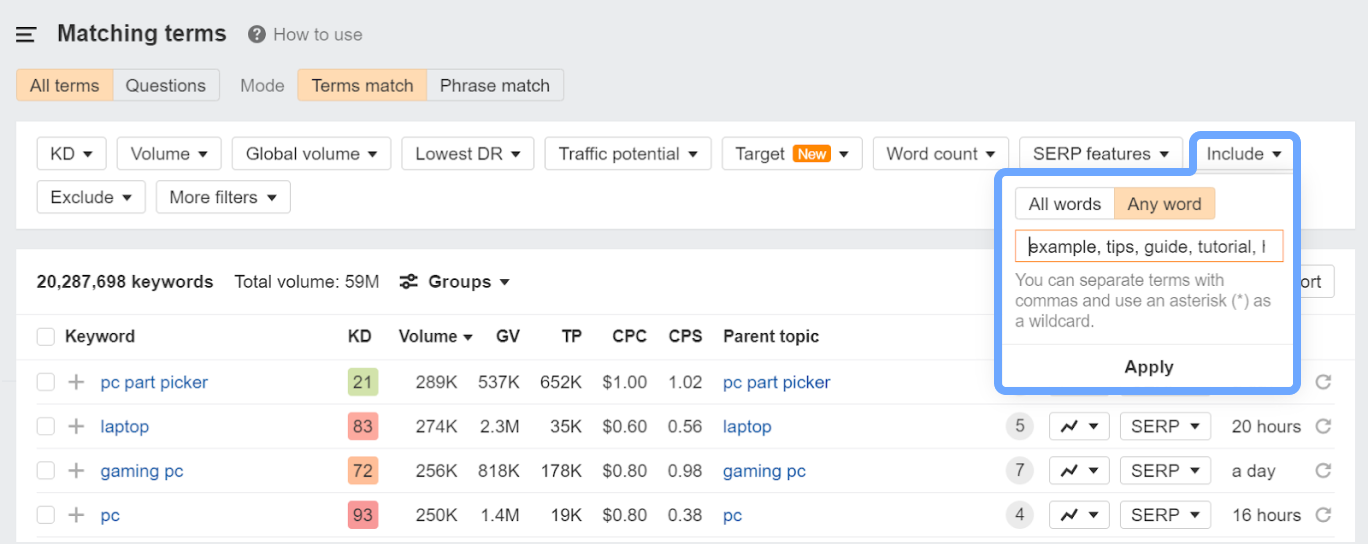
6. Assess Keyword Difficulty and Search Volume
Keyword difficulty measures the competitiveness of a keyword in search engine rankings. High competition keywords can be challenging to rank for, especially if you have a relatively new website. Prioritize keywords with moderate difficulty and decent search volumes to optimize chances of your keyword ranking well.
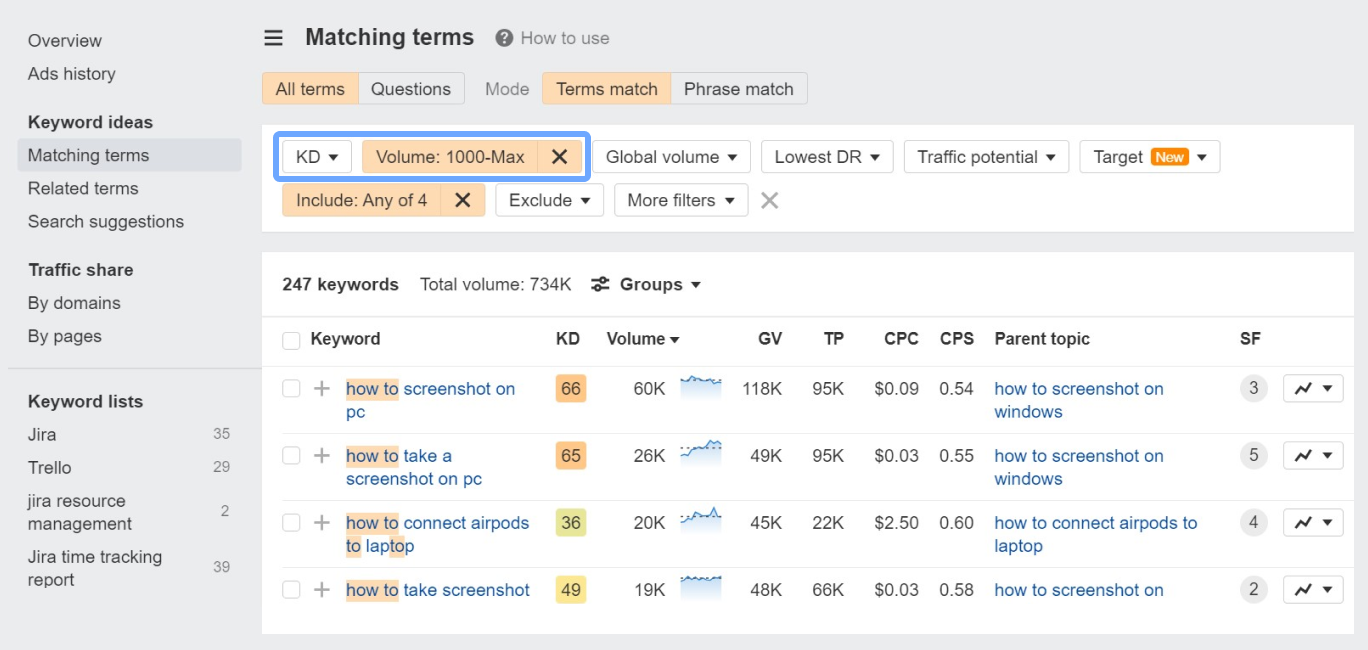
7. Group Keywords by Topics
As a single page can rank for hundreds or even thousands of keywords, sort results by parent topic to see if you can target your desired keyword while also covering more general topics on your pages. It's like hitting two birds with one stone! Rather than creating numerous articles, just choose the one with the most search volume, as long as it provides value for your business.

8. Analyze Competitor Keywords
Perform competitor keyword analysis to understand which keywords your competitors are targeting successfully. Tools like Ahrefs' "Competing Domains" feature can help you uncover your competitors' top-performing keywords. Learn from their strategies and identify gaps in the market that you can capitalize on.
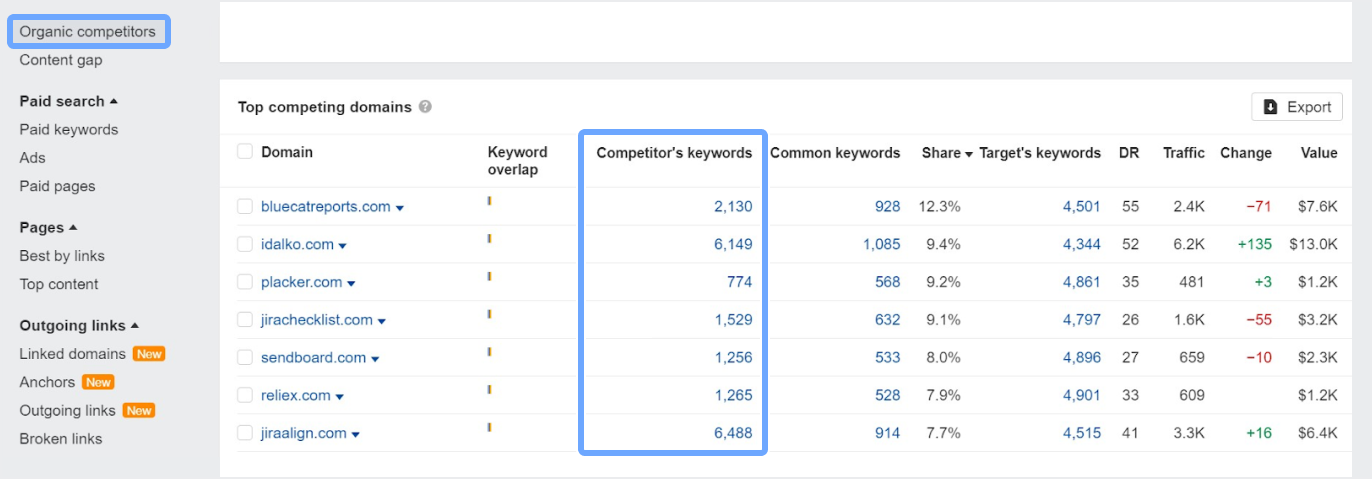
9. Assess Ranking Difficulty
There are a few things to look at when assessing the difficulty of ranking on Google for your chosen keyword. Firstly, examine the number of unique sites that are linking to the top-ranking pages. If you find that these pages don't have an overwhelming number of unique links, it's a promising sign that you have a good shot at achieving a high ranking.
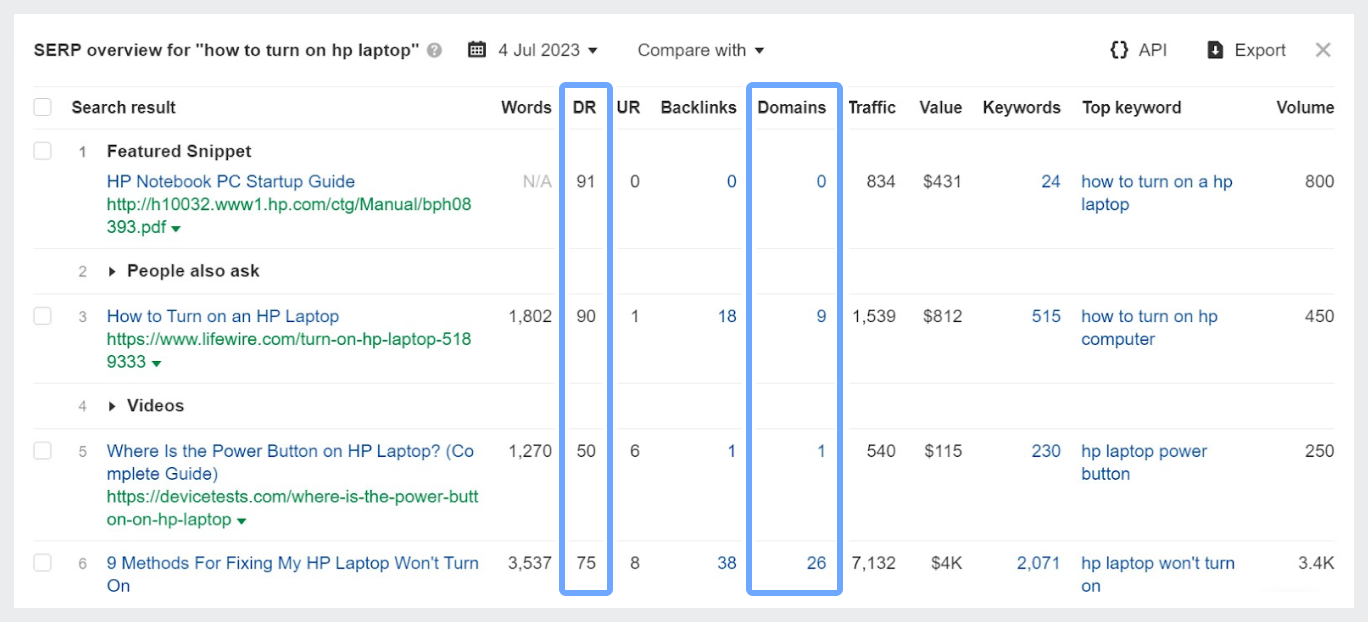
Also, take note of the Domain Rating (DR). In the example above, all the ranking pages come from powerful domains. So, if your site has a DR of 15, be prepared to go toe-to-toe with some heavyweight contenders. It's generally better to play in the same Domain Rating ballpark. If not, get ready to build more links than those top-ranking pages.
Conclusion
Keyword research is a powerful tool to boost your website's traffic and revenue. For instance, if you own a construction business, integrating contractor digital marketing services into your keyword strategy can help you connect with clients seeking specialized expertise in the industry.
By understanding your business objectives, identifying relevant keywords, considering user intent, and regularly doing keyword monitoring, you can create a well-optimized website that attracts the right audience and drives conversions. Embrace the art of keyword research, and you'll unlock the potential for lasting success in the ever-evolving digital landscape.
